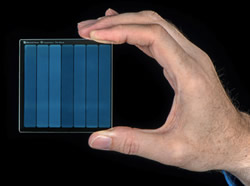Adam Clark Estes* says Microsoft has revealed a virtually indestructible glass hard drive that’s the size and shape of a drink coaster.

Photo: Microsoft
It sounds a bit ridiculous at first.
Dozens of gigabytes of data can now be encoded on a virtually indestructible glass hard drive that’s the size and shape of a drink coaster.
Microsoft just revealed a proof of concept.
It’s a thin square of glass that’s been laser-etched with microscopic geometric shapes called ‘voxels’ that contain a combined 75.6 gigabytes of data – the 1978 film Superman in its entirety.
The announcement is a publicity stunt, sure, but the idea of storing our most important data on slices of glass is undeniably poignant — and practical.
Microsoft calls this new glass storage system Project Silica.
Last week’s announcement happened in partnership with Warner Bros, the major Hollywood movie studio that produced said Superman movie.
According to the company’s press release, these little glass coasters could help Warner Bros transition its archives from vulnerable 35-millimetre film on to a medium that could last centuries.
Apparently, the Project Silica disks offer not only cheaper but also more durable methods for storing large quantities of data.
“Glass has a very, very long lifetime,” Microsoft Research Principal Researcher, Ant Rowstron told Variety.
His team says it tried baking the glass in ultra-hot ovens, submerging it in boiling water, microwaving it, scratching it with steel wool, but still the data remained uncorrupted.
“If you take a hammer to it, you can smash glass,” Rowstron added.
So, ultimately, glass can break.
When you think about it, though, a cold storage method like this holds lots of promise.
The term ‘cold storage’ refers to the process of storing data that doesn’t need to be accessed daily, weekly, or even annually but rather preserved for the long haul.
Many of the commonly used physical data storage techniques like tape, film, or compact disk are subject to deterioration over time.
Storing data on hard drives or servers ultimately leaves it vulnerable to deletion and, in the case of cloud computing, the final call of what gets deleted or kept might lie in the hands of careless overlords rather than users who ought to own that data.
Imagine if everyone had the power to store their data on a glass coaster and feel confident that it would remain there, untouched, practically until the end of time.
What a treat that would be!
Over the course of history, information and data have fallen victim to everything from tyrants to the elements.
The burning of the library at Alexandria, some 2,000 years ago, would have been less of a tragedy if this new Microsoft technology were available to the ancient Egyptians.
The better 21st Century analogy might be the mass deletion of many beloved websites initiated by some hostile management organisation.
What if, for example, you woke up one day to find that your entire Tumblr blog had been deleted because Tumblr management had decided that it was too expensive to let everyone create a Tumblr blog.
At that moment, you might feel lucky if you had that blog and its archive backed up on one of these fancy Microsoft glass coasters.
For now, we’re left to wonder about the future of Microsoft’s fancy Project Silica.
The Superman disk is just evidence that this idea works, but it’s unclear how Microsoft plans to commercialise this technology.
When it comes to saving information that would otherwise be thrown into the fire, however, we can all agree that users deserve control over their data.
If they can store that data in a way that can even survive the fire, all the better.
* Adam Clark Estes blogs about the future at Gizmodo. He tweets at @adamclarkestes. His website is adamclarkestes.com.
This article first appeared at www.gizmodo.com.au


